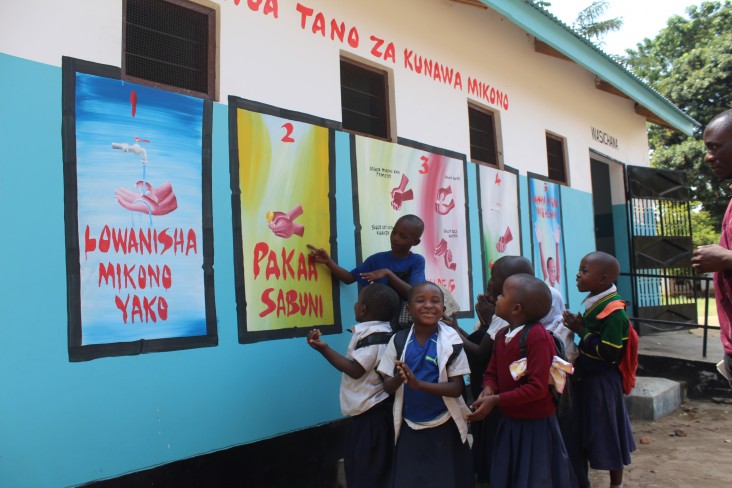Speeches Shim

When USAID's Water Resources Integration Development Initiative (WARIDI) began designing improvements to water, sanitation and hygiene (WASH) facilities at 25 primary and secondary schools, students from Muungano and Magubike Primary Schools in Tanzania’s Iringa region shared their difficulties accessing the toilets and washing their hands. Challenges included lack of separate facilities for boys and girls, no changing rooms or hygiene facilities to support girls during menstruation, lack of water access, and inaccessible latrines for students with physical disabilities. Access to sanitation in schools is critical as over 40% of diarrhea cases in school children result from transmission in schools rather than homes. Available WASH infrastructure not only prevents illness in students and teachers, but improves the learning environment and prevents students from dropping out of school. However, the provision of WASH toilets and taps isn’t enough to make a healthy school environment if all students cannot equally access them.
WASH and Accesibility
Access to WASH facilities is already a challenge in Tanzania where an average of only 57% of households have access to drinking water, and 25% have safely managed sanitation services. While investments in school WASH have achieved good results (69% of schools have drinking water and 66% have basic sanitation facilities), approximately 6% of Tanzania’s schools are accessible to students with limited mobility. Design and structural issues prevent students from accessing classrooms, toilets, and teachers’ offices and contribute to the 62% of disabled children who do not attend school. Inadequate WASH infrastructure can also be extremely prohibitive for girls in primary school. Over half of girls' school latrines in Tanzania do not have doors, which makes girls feel unsafe and up to 20% more likely to not go to school. In addition, 10% of girls in Tanzania drop out of school during menstruation because most latrines have nowhere to dispose of sanitary pads and are without changing rooms. Access to school WASH facilities is a national priority in Tanzania and a cornerstone of the National Sanitation Campaign. But if school WASH facilities aren't designed equitably, they won't have the desired impacts on health and education.
Designing Accessible WASH Facilities
For Mashala Maduka, School WASH Lead Engineer under WARIDI, tackling disparities in WASH starts with consulting the community. While visiting the 25 schools identified by Local Government Authorities as needing support on water, sanitation and hygiene, he met with representatives from each school to understand student and teacher needs and recognized that access to the existing infrastructure was particularly inadequate for girls and limited for students with disabilities. Lack of inclusion and limited consultation of users are often major flaws of engineering projects that contribute to inadequate maintenance where school budgets are already stretched. In each school, Maduka worked with students and teachers to prepare a design that had separate teachers’ facilities, ensured at least one handicap-accessible flush toilet was located in each block, changing rooms for girls were included, and incinerators to burn sanitary waste were part of the design.
Back to School
Once completed, students with disabilities from Magubike and Muungano were invited to tour their schools’ new latrine blocks. They were most excited to see the toilets with seats, since it was very painful for them to squat in the old facilities. These upgrades make toilets more accessible to students with disabilities and make hygiene and sanitation facilities cleaner and safer for all students. Magubike and Muungano are just two of the 25 schools WARIDI is working with, which will provide safer and more equitable access to WASH facilities for more than 14,000 students.

Comment
Make a general inquiry or suggest an improvement.